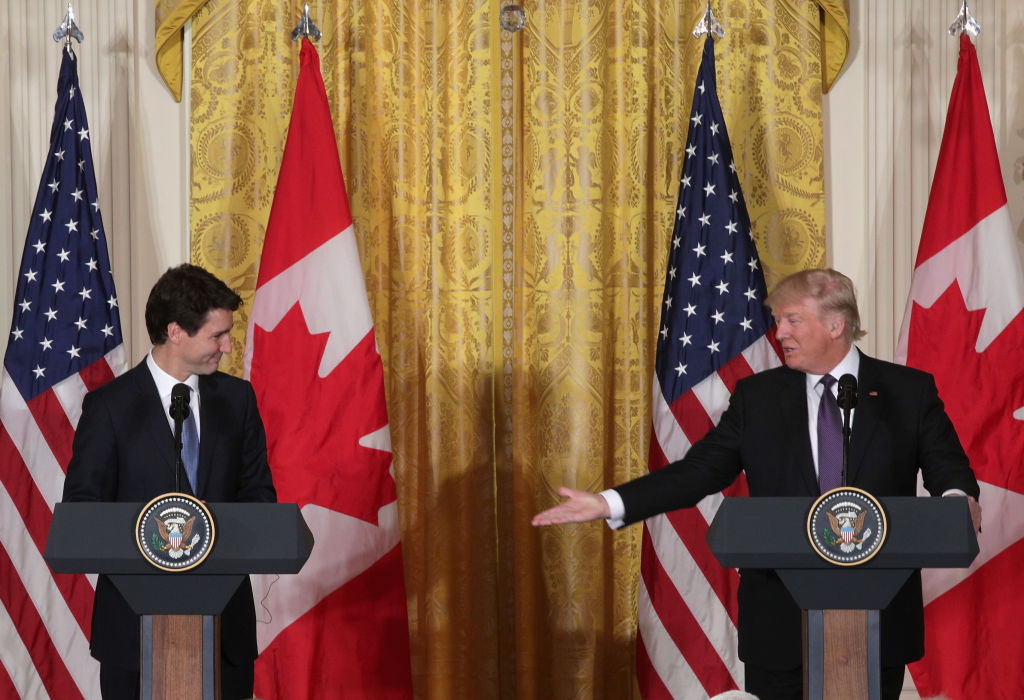How Trump and Trudeau Can Strengthen US-Canada Partnership

In collaboration with Anthony B. Kim*.
Canadian Prime Minister Justin Trudeau is set to meet with President Donald Trump on Thursday to discuss a range of issues, including the ratification of the revamped North American free trade deal.
Much has been said about the importance of our two countries’ trade relationship.
In 2018, bilateral trade amounted to $617.2 billion. The U.S. receives 18% of its imports from Canada, and Canada receives 76% of its imports from the U.S. At least 33 states export more to Canada than to any other country, and 15 have Canada as their first source of imports.
Beyond the trade relationship, the countries share the longest undefended border on earth as well as common values and culture.
Both countries do well on The Heritage Foundation’s Index of Economic Freedom, but Canada actually outpaces the United States in economic freedom, ranking eighth in the measure as opposed to 12th for the U.S.
Canada compares negatively to the U.S. in terms of judicial effectiveness, labor, and business freedom—and has fallen from eighth to 22nd on the World Bank’s Ease of Doing Business ranking over the past decade.
But Canada more than makes up for this with significantly better financial health, government integrity, and property rights protection.
Both countries have room for improvement, can learn from each other, and, for the cause of liberty, can work together to push each other in the right direction.
Indeed, the Index of Economic Freedom currently lists both countries as “mostly free,” but emulating one another’s best practices could vault them both into the “free” category.
To this end, The Heritage Foundation and the Montreal Economic Institute have begun facilitating a dialogue between policymakers, think tankers, and business leaders from both countries to showcase best practices that, if implemented, would advance economic freedom.
Recently, for example, American policymakers were introduced to Canada’s airport screening model, which relies on private security companies applying government standards.
By entrusting the private sector to carry out this mandate instead of unionized bureaucrats, Canadian airports have outperformed their American counterparts.
When it comes to business tax cuts, it is relatively unknown that Canada actually provided a useful blueprint.
Canada’s federal corporate tax rate was reduced from 28% in 2000 to 15% in 2012, and government revenues remained relatively stable over the period. A presentation of this success story was made last year to key American influencers.
In the coming months, a cautionary tale from Canada could prove salutary to the United States as Democrats tout various forms of socialized health care as a way to cure all ills with America’s current system.
Canadian doctors and physicians are world-class, but it can prove to be a challenge to get face time with them.
When health care is “free,” the most effective way to contain costs is to ration services, which results in wait times in Canada that are unheard of in the United States.
Highlighting such facts may help the American public and policymakers avoid a walk down “the road to serfdom.”
The U.S. and Canada enjoy exceptional diplomatic relations and countless shared values and passions—with pro basketball being just the latest example.
Our organizations recognize as much, and this is why we are endeavoring to further this relationship—this time in the public policy realm.
A closer partnership with Canada is something we should all get behind. And as an added bonus, this time, we can all cheer for the same team.
Michel Kelly-Gagnon is President and CEO of the Montreal Economic Institute, Anthony B. Kim is a research manager at The Heritage Foundation. The views reflected in this op-ed are their own.

